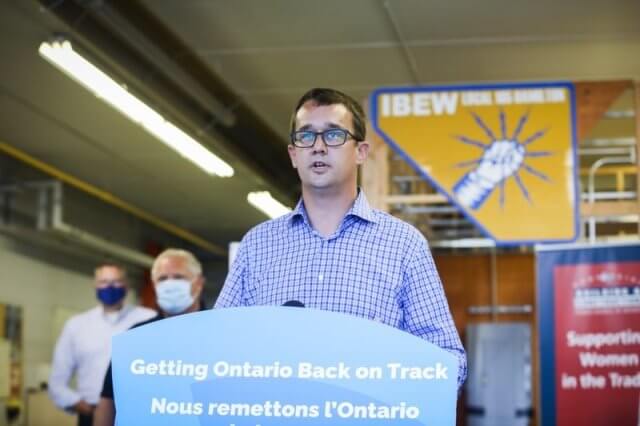
Ontario Helping Francophone Newcomers Find Good Jobs
Bridge training will help internationally trained workers contribute to the provincial economy
THE VOICE OF CANADA-TORONTO — The Ontario government is investing more than $1.5 million to help skilled Francophone newcomers receive the additional training they need to get a license or certificate to work in their trade or profession in Ontario. The funding is provided through the Bridging Participant Assistance Program and the Ontario Bridge Training Program and will help connect hundreds of Francophone newcomers with good jobs.

Details were provided by Monte McNaughton, Minister of Labour, Training and Skills Development and Caroline Mulroney, Minister of Francophone Affairs.
“Helping newcomers to get the training and retraining they need to work is paramount to Ontario’s economy, and eventually to our recovery from the COVID-19 pandemic,” said Minister McNaughton. “Our government knows that welcoming newcomers and immigrants will allow us to further grow and diversify our communities, while expanding and building the skilled workforce we need now and in the future.”

The Ontario Bridge Training Program is providing $14 million over three years to Accessible Community Counselling and Employment Services (ACCES) to help 2,698 internationally trained professionals access the labour market in the areas of customer service, education, social services, management and finance. Almost $1 million of this funding is going towards the Sales & Service en Français program specifically targeted to Francophones; so far, 120 people have completed this program. $500,000 of the funding is also going to the Speed Mentoring en Francais program, which offers newcomers speaking French and English the opportunity to meet and network with professionals working in their field, so they can build valuable connections and accelerate their employment journeys post-immigration. Since 2018, 306 people have completed this program.
Through the Bridging Participant Assistance Program, the government is providing $127,600 to Collège Boréal to offer up to 65 highly-skilled Francophone newcomers financial supports to offset the costs of bridge training that will support them in getting certified to work in their field in Ontario. Eligible newcomers can be provided with up to $2,100 to cover tuition, books and equipment costs. Participants must apply at the financial offices of the Collège Boréal campuses in Toronto, Mississauga, Hamilton, London and Windsor, where the training would take place.

“Fostering a vibrant labour market and ensuring that Francophone newcomers can fully contribute to our economy is absolutely critical,” said Caroline Mulroney, Minister of Francophone Affairs. “Successful integration is a key factor in both the success of Francophone immigration to Ontario and the province’s efforts to support renewed economic growth and jobs post COVID-19.”
QUICK FACTS
- Those interested in applying for the Ontario Bridge Training program through Accessible Community Counselling and Employment Services (ACCES) can learn more here and apply at one of the three ACCES Employment locations.
- Internationally trained professionals who need financial support are eligible to apply for an Ontario Bridging Participant Assistance Program bursary if they are enrolled in the Ministry of Labour, Training and Skills Development (MLTSD) approved programs that are currently or formerly funded through the Ontario Bridge Training Program, and aren’t eligible for OSAP funding between April 1, 2020 and March 31, 2021.

- The Ontario Bridge Training Program (OBTP) is one of many programs offered by Employment Ontario, which includes more than 300 partner organizations across Ontario that offer a range of free services and supports that help businesses find workers and connect jobseekers to training and job opportunities.
- More than 170,000 internationally trained immigrants in Ontario are working in jobs that do not match their level of qualification. This does not include those who are underemployed or dropped out of the labour force.




